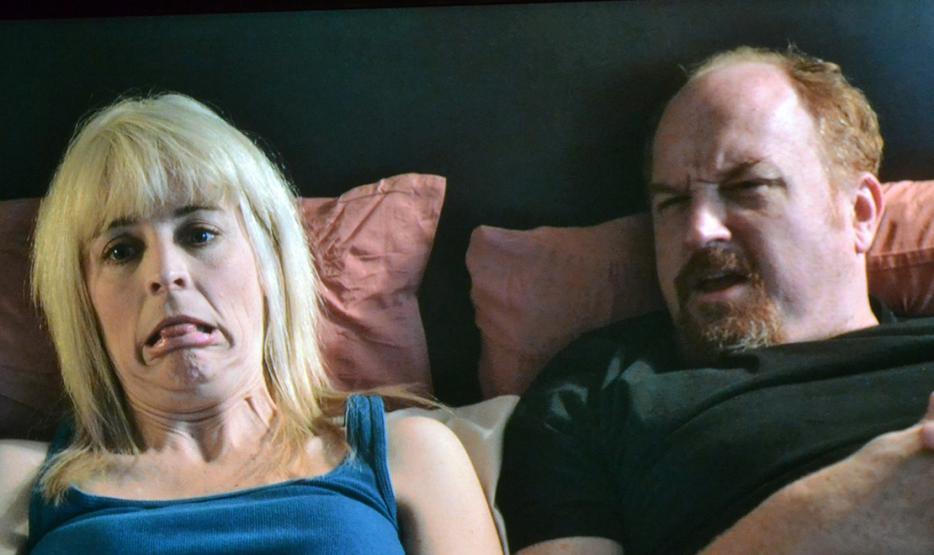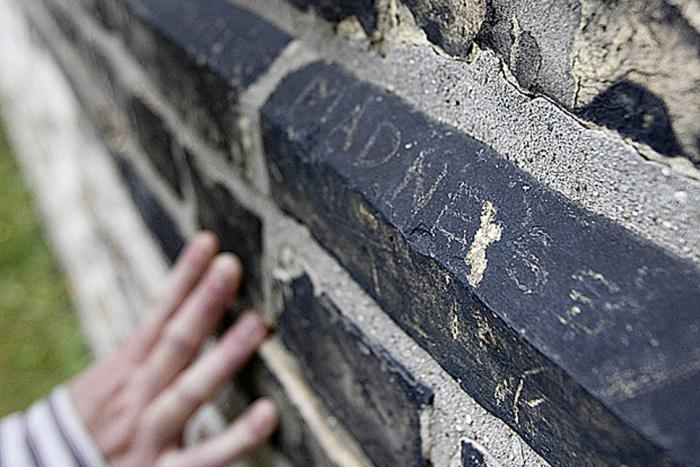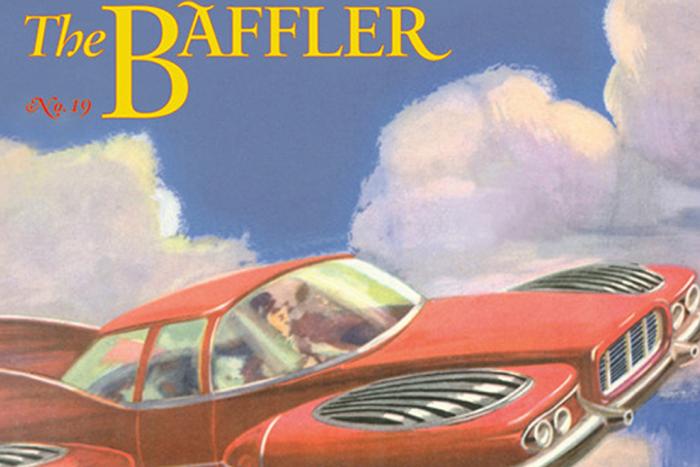In 2005, Maria Bamford embarked on The Comedians of Comedy tour with Patton Oswalt, Brian Posehn, and Zack Galifianakis—the four having been packaged together as the vanguard of alternative comedy. Oswalt and Posehn brought an angry nerd rage to their sets, while Galifianakis trafficked in a controlled type of absurdism, something that’s been sadly absent from his recent work. But even among this group, Bamford stood out as a bit of a weirdo; at the time, Oswalt described her as “like a Martian making racist jokes about Earthlings.”
Her material can be dark and id-driven: she jokes about mental illness and her therapist (pronounced “the rapist”), and she named her last album after a condition she suffers from called “unwanted thoughts syndrome,” which is basically what it sounds like. Recently, she’s been closing her live show with a prolonged riff on suicide prevention, a bracing piece that is both powerful and totally absurd. (Sample joke: “Depression is telling you that you’re a burden and a waste of space. That also describes the Great Barrier Reef.”)
The darkness, though, is cut by silly digressions and startling impressions—Bamford is less a mimic than a vessel for characters of both great cruelty and great banality. During her stand-up sets, Bamford hops between voices, channeling people from her own life (provincial Minnesotan classmates, uppity office workers) and from within her own head (giving life to some of her most ominous anxieties). In her short-form online sitcom, The Maria Bamford Show—a fictionalized account of the comic rebuilding her life after a mental breakdown—she played all of the characters, including her abrasive parents and hectoring sister. Her ability to lampoon obsessive Midwestern types is so good, she was actually hired by Target to serve as a mascot in a series of TV ads a few years ago. It’s a strange gig for her.
In the last five years, Bamford’s output has been steady—a CD here, a voiceover there. This summer, she appeared on a few episodes of Louie (she remains the only female comic Louis CK has dated on the show) and continues to pop up on programs in the Tim and Eric universe, including a part as a cosmetician who makes over John C. Reilly’s Dr. Steve Brule. She also provides many voices on the de rigueur cartoon-for-adults, Adventure Time, and has a small part on the soon-to-return Arrested Development.
Meanwhile, her fellow Comedians of Comedy have carved out a place in mainstream: Oswalt’s now on Two and Half Men, and Galifianakis is too busy doing The Hangover to perform stand-up any more. Bamford has yet to make the jump; Louie might be the first time she’s played “normal” without seeming like a parody of normal. In spite of this—or possibly because of it—she’s considered one of the best stand-up comics working today, with a devoted base of true believers. At a Toronto show in 2010, a fan shouted to Bamford on stage that she had named a pet “Maria Bamster” in her honour.
Bamford’s new stand-up special, available for download Wednesday—this link should be active this afternoon—encapsulates her outsider aesthetic. Eschewing the large, cheering crowds that are typical of this kind of thing, Bamford has chosen a much more disquieting setting: her living room, where she performs for her actual parents. She spoke to Hazlitt from her home in California.
*
The concept of your new special is really interesting—it’s just you telling jokes in your living room to your parents.
Yeah! The primary audience is Marilyn and Joel Bamford. Why have the middleman of 600 strangers in a theater in Culver City, when I can go straight to the source of who I want approval from? It is quieter than your normal special, usually there’s a lot of applause, and, lets be honest, laughter. My parents did laugh as much as they could, but it is a quiet living room filled with film technicians. My parents are sandwiched between the sound guy and somebody else with a camera.
It’s weird to see comedy in a hermetic seal. Did you see the videos of Letterman doing his show right after Hurricane Sandy hit? He sent the audience home, and then just told jokes into a void. It was really unnerving.
That is very much what this is like! It’s extremely intimate. For tapings, I feel embarrassed because they hype people up. There’s a big warm-up act. There’s a lot of excitement building for the comedian coming out. Something about that, as a self-deprecating comedian, doesn’t really fit. Aren’t we supposed to act like this isn’t a big deal? I just know that when I’m in the rock star feeling, up on stage, the whole crowd is lathered up—I think that’s because they give them hard candy—it feels kind of odd. Because isn’t comedy supposed to be about, whatever, saying the truth about things? It’s this completely false situation.
What I’ve learned is that performing for my parents was completely false as well. Because they felt a lot more pressure to laugh with me there, and they laughed harder. It was artificial.
I remember reading in Steve Martin’s biography that he hated doing big shows in stadiums because it didn’t feel like comedy. It felt like hosting a party.
Yeah, that’s true. And people are yelling, “yeah, this is happening!” It doesn’t matter about the jokes, it’s just “Do that thing, but do it really big because I can’t see it from here!” That’s not what I was interested in at the beginning, or what I enjoy. I watched Dane Cook’s special at Madison Square Garden, it’s sort of a theatre in the round, and that just looks terrifying to me. It looks like a religious experience. I feel more comfortable in a smaller venue. That could be low self-esteem, or a fear of success, or any number of those things.
Many of your jokes are about your parents, and that’s especially true in The Maria Bamford Show, where you play them.
I’m grateful that I do jokes and they find them funny. Sometimes, they deny that what I said actually happened. My dad opened for me once—it was at a motorcycle rally, and I paid him to do 10 minutes of material. He wrote all of his own material, and he wouldn’t tell me any of his jokes in advance. But he did tell me this one—he said, “I was at the Duluth airport and my daughter was supposed to come pick me up at the airport, and she’s not there. And I call her and I go, ‘Hey where are you?’ And she says ‘I forgot.’” And I said “dad, did that actually happen?” He said, “Oh, it’s got to be true?”
So, he didn’t understand the premise that jokes are supposed to be exaggerations of things that actually happened?
I think he’s got a point, in that sometimes I do make things up completely. I do a thing about “joy whack-a-mole”—the joke is, at family dinners, when somebody brings up something they’re happy about, then someone else smacks it down. That’s true, my family does that. But I’m the best at that game, and in the joke I come out looking like the victim. I wish I could re-write it. I would re-write it to be a back-and-forth thing, but the way it’s written, they’re the players of the game.
That being said, most things do genuinely happen with my mom. I came home to visit recently, and she couldn’t find me in the house, and she called my sister and said “Maria’s disappeared. I’m worried she’s killed herself, and I have a hair appointment in town.” And she did say that verbatim, word for word. And that’s hilarious. I’ve had people impersonate me, and that’s painful for me, because you see how someone else sees you. So it’s very generous that they don’t seem to mind.
I saw you do your suicide chunk in Toronto about two years ago. The premise is that you are basically trying to dissuade people who might be considering suicide. It’s really bracing. And maybe not that funny. Did you do it for your parents?
Yes. I feed them pizza right before the suicide chunk so they can stuff their feelings. I don’t know if it’s funny, but it’s really important to me. I think it’s gotten better since you’ve seen it, it’s developed more and I have performed it so many times that I’ve become less attached to it, which can help the material. But it is for audiences who are specific, who are already on board with what I might have ideas about. I know if I went up anywhere else, outside of my neighborhood of hipsters, I’m pretty sure it wouldn’t go very well. That’s ok. Not everybody likes those Australian Tim Tam cookies, even though they’re the best cookies in the world.






